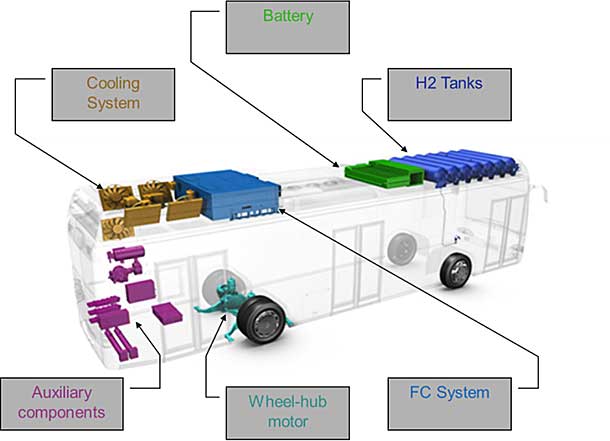
Now that hydrogen fuel cell buses have become more commonplace, I need to ask the question where are all of the hydrogen fuel cell school buses?
One of the many advantages of traditional hydrogen fuel cell passenger buses (besides being greener running and involving less maintenance) is that they are before the public eye and help promote H2 technology. The same would apply to hydrogen fuel cell school buses plus more.
Fuel cell school buses would be in front of the eyes of students, teachers, parents and educational administrators, normalizing this technology. In addition, fuel cell school buses can be used as a learning tool for students interested in leading edge, clean vehicle technology. And then we have to consider the “clean” part of this technology.
In 2009, according to School Transportation News, “Water is the only tailpipe emission for fuel cells, and DOE said that the systems would offer a clean transportation option for school systems, particularly in urban areas where air pollution is a problem. Fuel economy of hydrogen is also reported to be twice as high as conventional diesel buses currently in service and approximately 12 percent more efficient than current gasoline hybrid electrics. Manufacturers claim that fuel cell buses may become competitive sooner rather than later when their lifecycle costs are compared to rising diesel fuel prices.”
In December 2008, the U. S. Department of Energy (DOE) release a report to Congress called “Fuel Cell School Buses Report to Congress” where some of the key advantages and challenges were noted. Two of the advantages at that time were that fuel cell buses (see diagram below) were already in use and lessons can be learned from the rollout of the CNG (compressed natural gas) buses. The main disadvantages at that time were the high cost of fuel cells and the cost of infrastructure.

One section of the document states, “A robust fuel cell transit bus program already exists and can provide important lessons learned toward the future development and use of fuel cell school buses. The compressed natural gas (CNG) bus market followed a similar development path-initial efforts focused on CNG transit buses, and school bus developers and users were able to benefit from key lessons learned before adopting CNG technology.”
Since 2009 the discussion of rolling out hydrogen fuel cell school buses seems to have dropped off the map. In the past 7 years, the cost of fuel cell systems and hydrogen refueling infrastructure have come down tremendously as evidenced by the increasing creation and deployment of public transit fuel cell buses in the USA and Europe. According to the CHIC Project, there are over 90 fuel cell buses in Europe in operation or about to start operation.
In the U. S. the DOE says fuel cell school buses are DOA. Let us remind them that this doesn't have to be the case as hydrogen and fuel cells have come a long way since 2009.
References
http://www.hydrogencarsnow.com/index.php/hydrogen-buses/
http://www.hydrogencarsnow.com/index.php/category/hydrogenbuses/
https://www.hydrogen.energy.gov/pdfs/epact_743_fuel_cell_school_bus.pdf
http://stnonline.com/news/latest-news/item/365-barriers-remain-to-hydrogen-fuel-cell-school-buses
https://www.law.cornell.edu/uscode/text/42/16093
http://its.berkeley.edu/btl/2014/spring/hydrogen
http://chic-project.eu/fuel-cell-buses-in-europe
No comments:
Post a Comment